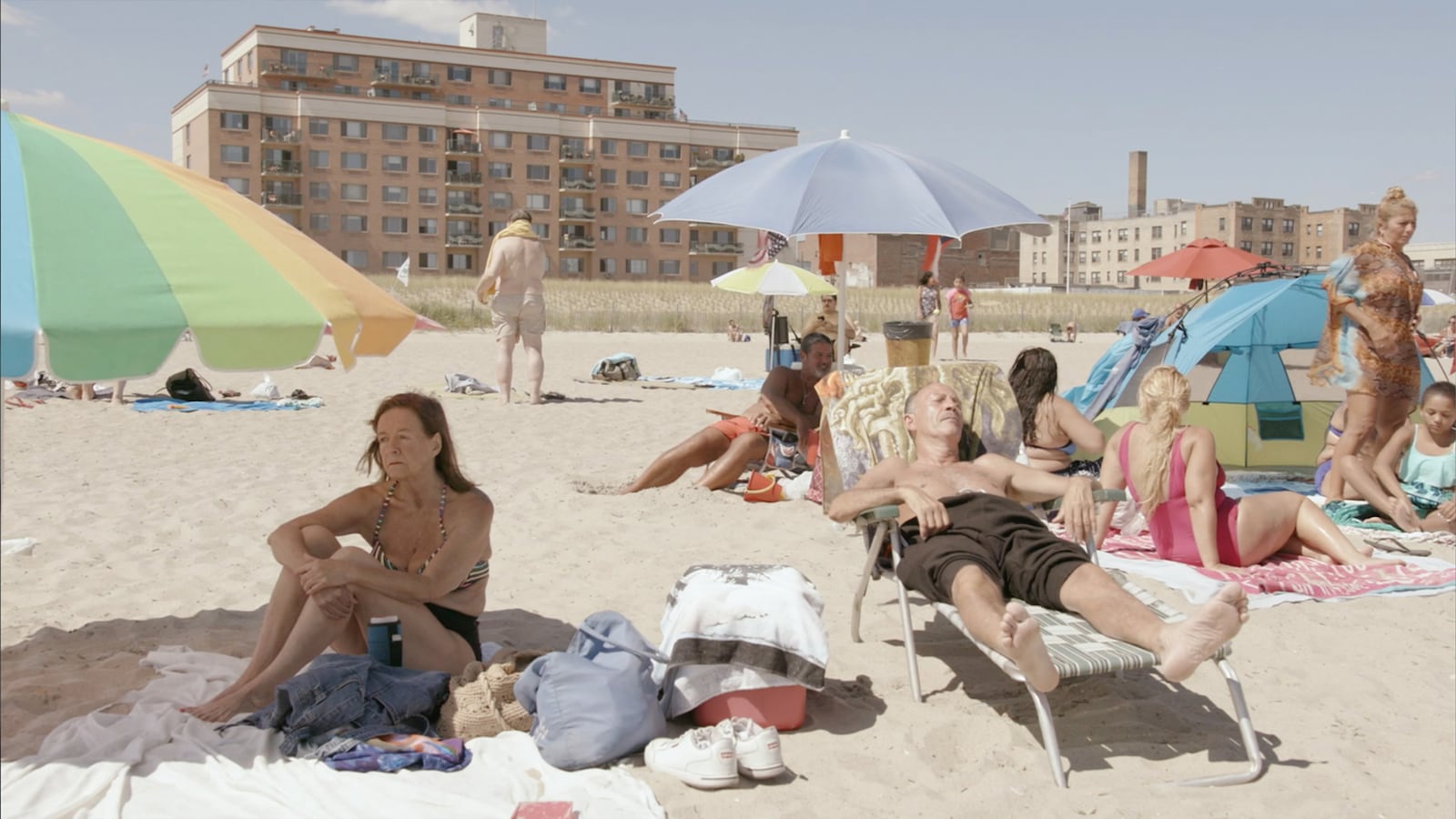Filmmaker Brett Story knows how to ask good questions and then interpret the answers she receives—no matter how spicy, offensive, banal, or surprising—beyond the individual who speaks them.
With her third and upcoming film, The Hottest August, the documentarist and human geographer demonstrates her skills as both patient observer and active visionary. The film spends time with a smattering of New York City residents in August 2017, during which we see and hear these individuals (and couples and families) express thoughts about their lives and conditions—past, present, and future.
Thematically, The Hottest August is about climate change, but it’s not a hot button issue doc: The subjects’ perspectives are punctuated by Story’s own strong ideas, which run throughout the documentary’s action via sounds and images. The interviews she conducts with subjects are the text, and the metaphorical sequences she shoots—of a person floating on their back in a depressingly gray Atlantic Ocean, of a group descending from a broken cyclone ride, of subway riders staring intensely at nothing—are the subtext.
Very little of the resulting discourse—in interviews and with an occasional detached, robotic voiceover (Chris Marker’s experimental documentary Sans Soleil comes to mind but his earlier, 1960s-set doc Le joli mai is a better comparison for overall approach)—is obviously about climate, at least in the ways we’re used to talking about it. Instead, The Hottest August asks us to think about personal responsibility and collective pain, individualism and community, art and capital, activism and self-preservation—the weather and the climate.
Story’s body of work—including this film, previous documentaries Land of Destiny (2010) and The Prison in Twelve Landscapes (2016), and the book Prison Land (2019)—argues for a steadfast, curious but never sensational commitment to telling the truth. What results is a moving portrait defined not only by Story’s openness but also her insight, a combination of skills that is sorely lacking from the popular punditry tasked with taking on the latest flare-ups of American “political division.” In the absence of compelling ideas, these mediators, like comedian-hosts Bill Maher and Sarah Silverman, documentarist Errol Morris, and author J.D. Vance find themselves caught in the justification game. They either gaze on at injustice, wondering how it might be reconciled with our present nightmare reality or balk at what just doesn’t seem—to them—to fit it. Story, on the other hand, has studied the pernicious systems that aren’t only a part of our present politics and shared histories, but our physical environments as well. And she hasn’t just learned about them, she has also developed ideas informed by her own experiences and activism. And what’s more, Story doesn’t announce her opinions or lead others to repeat them. Instead, she shows us how people’s wildly differing perspectives are often reflective of the same systems that operate in their shared communities. In The Prison in Twelve Landscapes, for example, a physical prison doesn’t appear until the very end—the story is told expansively, outside of the cells and blocks.
And in The Hottest August, New York City’s residents are not so much politically divided as they are physically, which informs how they see the world and their places in it. In an interview with Film Comment, Story explained that it was much easier to find working-class, middle-class, and poor subjects than it was to find rich ones. That’s because while the non-rich spend time in public spaces, like parks and sidewalks and the beach, the rich sequester themselves inside. The film demonstrates the banality of this conundrum, while attending to its very real consequences. People of similar circumstances don’t necessarily think the same way, but a faith in individualism courses through the psyches of many of the film’s subjects. A single black mother who had a brush with death says her goal is to own property so that her children will always have somewhere to go; a white Italian-American woman says she worries about herself and the present, not climate change; an art-collecting hedge fund manager insists that there is no better alternative to capitalism, which he believes must continue to expand in order to benefit everyone; a young black woman at housing court says that her future is up to her, and she must make the changes to end up where she needs to be. It wouldn’t be a stretch to guess that each of these people have very different ideas about who should be president, what good tax policy looks like, and weather Medicare for All ought to be enacted. Yet they all adhere, to some degree, to the rugged individualist ideal, believing that they alone are responsible for their success or failure.
Still, Story engages her interviewees without idealizing or vilifying them. Instead of talking-head close-ups, her camera sits at a middle distance: In the opening interview of the film, two union men poke their heads out of a second-story window to speak their piece. Story is a woman on the street, but she gives her subjects genuine, sustained attention, even when the interviews are very short. She asks two friends on the beach how they met and what they do for a living—one runs her own cleaning business and the other is a bus driver who used to have an office job—and spends time with an artist who performs as an “Afronaut,” a mix between an Afrofuturist and alien astronaut—in order to understand how different people situate themselves in time and space.
The Hottest August isn’t flashy or exclamatory—it doesn’t offer us easy answers or comforting clichés. There are no zesty arguments between people in business casual, no righteous exclamations, and not an infographic in sight. Instead, the film urges a sense of coherence in our political arguments, and a willingness to not only confront our own conditions, but how they fit into a wider world.

